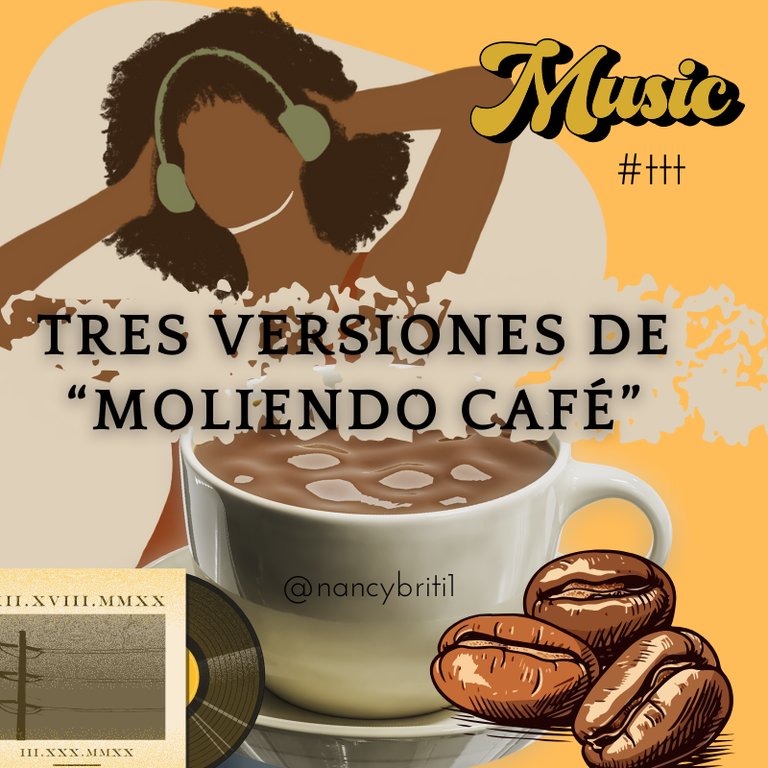#ttt: Tres versiones de "Moliendo café"/ Three versions of “Moliendo café”

Tres versiones de "Moliendo café"

Esta semana pensé en traer a esta iniciativa diferentes versiones de una misma pieza musical y quise comenzar con una de las canciones venezolanas más emblemáticas de todos los tiempos, después de «Alma Llanera», «Venezuela» y «Caballo viejo», que ha sido versionada en todo el mundo: «Moliendo café».
Aunque hay controversia al respecto, esta pieza es de José Manzo, tío de Hugo Blanco, quien la interpretó en 1958, y a partir de ese momento se hizo tan popular que no sólo cantantes como la italiana Mía, Julio Iglesias, Paco de Lucía, Lucho Gatica y Plácido Domingo la han interpretado, sino que se ha convertido en un himno para los fanáticos del fútbol. Nuestra amiga Wikipedia dice de ella:
"Moliendo Café" se ha convertido en un canto popular para los fanáticos del fútbol de todo el mundo, y en Europa es ampliamente conocido como "Dale Cavese" . El cántico fue adoptado por primera vez por los hinchas de Boca Juniors unos años después de que Julio Iglesias grabara la canción en 1976, y se hizo popular en La Bombonera durante algunas décadas, donde los hinchas conocen el cántico como "Dale Boca" . El cántico fue recogido por hinchas del equipo italiano Cavese 1919 tras toparse con un CD de cánticos de Boca Juniors. Los fanáticos lo usaron por primera vez en un partido contra el Ancona en septiembre de 2006, y un clip de su canto "Dale Cavese" se subió a YouTube en 2007. El video se volvió viral y su popularidad luego se extendió a otros clubes alrededor del mundo, con muchos fanáticos adaptando los cánticos para sus propios equipos.
Por si no lo han escuchado, aquí le dejo una muestra de este fenómeno. "Moliendo café" en las canchas de fútbol.

Los videos compartidos son de Youtube, el texto fue traducido con Deepl

Esta es mi participación de esta semana en la iniciativa de nuestro gran amigo @ablaze :Three Tune Tuesday. Si quieres participar, aquí te dejo el enlace al post de invitación

Gracias por leer y comentar. Hasta una próxima lectura, amigos.
![Click here to read in englis]
Hello, friends of Hive. It's Tuesday and as we all know, Tuesday is music Tuesday at Hive. Our friend @ablaze infected us with this dynamic that I think is wonderful and that is to share, every Tuesday, three pieces of music. I must confess that with this initiative I have met new singers, very good ones, and a little more music, which is perfect for me.
This week I thought of bringing to this initiative different versions of the same piece of music and I wanted to start with one of the most emblematic Venezuelan songs, after “Alma Llanera”, “Venezuela” and “Caballo viejo”, which has been covered worldwide: “Moliendo café”.
Although there is controversy about it, this piece is by José Manzo, Hugo Blanco's uncle who interpreted it in 1958, and from that moment on it became so popular that not only interpreters such as the Italian Mía, Julio Iglesias, Paco de Lucía, Lucho Gatica and Plácido Domingo, but it has also become a hymn for soccer fans. Our friend Wikipedia says about it:
“Moliendo Café” has become a popular chant for soccer fans around the world, and in Europe it is widely known as ‘Dale Cavese’ . The chant was first adopted by Boca Juniors fans a few years after Julio Iglesias recorded the song in 1976, and became popular at La Bombonera for a few decades, where fans know the chant as “Dale Boca” . The chant was picked up by fans of Italian team Cavese 1919 after coming across a CD of Boca Juniors chants. The fans first used it in a match against Ancona in September 2006, and a clip of their chant “Dale Cavese” was uploaded to YouTube in 2007. The video went viral and its popularity then spread to other clubs around the world, with many fans adapting the chants for their own teams.
Another version that I find surprising is the one performed by Mika Agematsu, a Japanese folk music harpist. When we see a musician from a country so far away, with a culture so different from ours, performing with such passion, her eyes shining and her face smiling, a Venezuelan native piece like “Moliendo café”, she reminds us that music is the universal language.
One style is never enough, that is why “Moliendo Café” has made different proposals. From the typical bolero, pop, salsa, rock, to new proposals where the genres merge and the queen is always the music, the creativity. In this version you can feel the musical sounds of soul, jazz, street funk and electric guitar solos. A contemporary, fresh proposal that demonstrates the timelessness of “Moliendo Café.
It is interesting, at least for me, to see how a Venezuelan folk song not only manages to transcend the borders of a country, but also to endure in time and make the new generations, always so confronted with the old and seeking to create new things, not only recognize the value of a song, but also make it their own and reinterpret it. Not for nothing, but music creates unbreakable bonds.

Impresionante como este tema icónico del Folclore Venezolano le ha dado vuelta al mundo, excelente reseña. Y que viva la música!! Saludos!!
Qué viva!! Saludos y gracias por comentar
Congratulations, your post has been curated by @dsc-r2cornell. You can use the tag #R2cornell. Also, find us on Discord
Felicitaciones, su publicación ha sido votada por @ dsc-r2cornell. Puedes usar el tag #R2cornell. También, nos puedes encontrar en Discord
Feliz y agradecida por vuestro apoyo, amigos!
Wuao, it's a thrill to see this theme of our culture going around the world. Thanks for sharing.
Regards @nancybriti1
Ciertamente: es un orgullo!! Esta pieza, además, tiene una riqueza melódica, que, he escuchado, hasta al mejor crítico musical, le gusta. Saludos y gracias por tu comentario